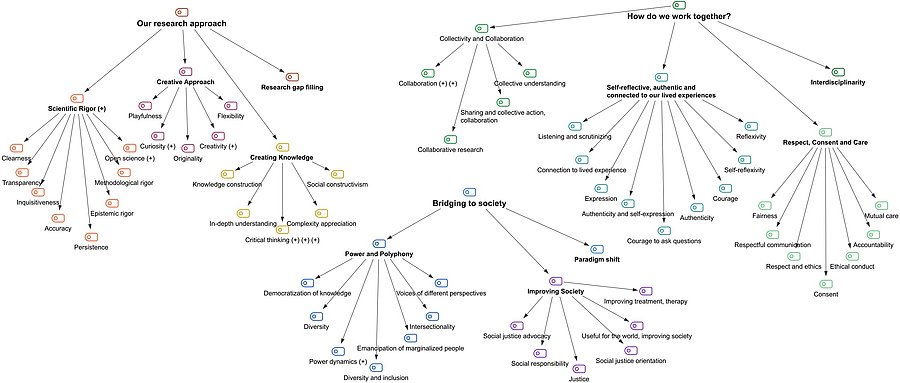Mission, Vision and Values
We developed our mission in a workshop and had the results summarised by Chat GPT. We then adapted the text in line with our shared understanding.
Mission Statement
- Renewing the understanding of madness
- Challenging established ideas about schizophrenia* and changing the way schizophrenia* is viewed
- Develop a more complex conceptual framework for dimensions of selfhood
- Better understanding of psychotherapeutic and recovery processes
- Promoting hope and support for recovery from schizophrenia*
- Amplifying the voices of peers in research and psychiatry
- Bridging the discourse between different specialist areas
This collective mission aims to promote understanding, fight stigmatisation and improve support for people with psychosis and schizophrenia*.
Vision
Translating findings into daily practice
We want to conduct effective research and translate our findings into practical changes so that they have a positive impact on everyday psychiatric practice.
Better support and understanding
We want to better understand people with schizophrenia* and their experiential changes. We envision that the way we understand humanity can change through interdisciplinary communication and collaboration, participatory research and involvement of the people affected.
Collective growth and advocacy
As a team, we want to enjoy the collaborative process. We also want the participants to find value and joy in their participation, and it is our aim to faithfully reflect their lived experiences.
We expect that we will feel personally addressed and changed by this project.
Beyond the duration and scope of the project, we want to advocate participatory research and network with other peer researchers at regional and international level so that our conclusions can change mental health care.
Values
Co-production
(peer-)interdisciplinary, collaborative, self-reflective and respectful
(Peer) interdisciplinarity and collaboration
We include various disciplines and fields of study in our work and considerations.
We promote collaboration in research by working towards a common goal and making decisions together.
We strive for a common understanding by bringing together our different perspectives.
You can find more information on this on our page about interdisciplinarity.
Self-reflexivity and connection
We want to be able to stay in touch with ourselves and with each other.
We are determined to ask each other questions with courage and to listen to each other with genuine interest. Our answers should be open, approachable and based on our own experiences. We question our own prejudices and assumptions.
We encourage each other to stay true to ourselves and to express our thoughts and feelings honestly.
Respect, consent and care
We attach great importance to treating all persons with dignity and adhering to moral principles.
We pay attention to respectful communication and mutual care.
We want to achieve equal opportunities and equal treatment for everyone involved.
We justify and explain our research decisions and measures.
We respect the autonomy and informed decision-making of all participants, research participants and researchers.
Research Approach
accurate, transparent, critical and creative
Closing research gaps
Our plan is to address the lack of scientific research in the field of phenomenology of recovery.
Scientific rigour
We maintain high standards of accuracy and validity in our research.
In the spirit of Open Science, we emphasise transparency and accessibility in scientific research.
We want to communicate ideas and concepts in a concise and comprehensible form.
Create knowledge
We build knowledge by promoting and valuing complexity and critical thinking and constantly strive for in-depth understanding.
We observe and appreciate the subtleties and nuances of our research topic.
We recognise the influence of social factors on knowledge construction.
We value the ability to critically question, analyse and evaluate information and ideas. We are open to changes in research approaches and want to develop innovative ideas or approaches and open up new and imaginative solutions or perspectives.
Building Bridges to Society
Paradigm shift
We see the potential in our research to challenge existing beliefs and paradigms and to support a paradigm shift.
Improving society
We need to address social issues and make a positive contribution to society and the well-being of all. Our actions and initiatives should promote fairness, equality and human rights. We want to contribute to the transformation and democratisation of society by keeping an attentive eye on power structures and diversity of voices in our collaboration and beyond.
Power and polyphony
We constantly question hierarchical structures and endeavour to promote equal access to knowledge, different points of view and the inclusion of affected persons in research.
We take into account the interweaving of social identities and the resulting experiences of discrimination and privilege.
We accept and value differences in perspectives, backgrounds and identities. We recognise and analyse the power imbalances that exist within social structures and relationships, including in our research project.

